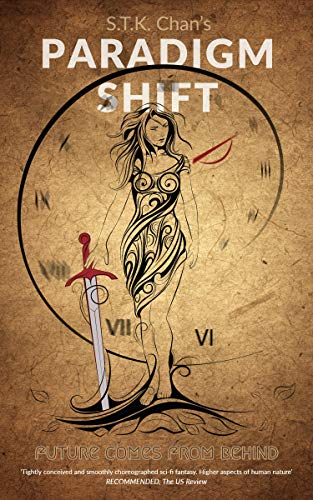
The fundamental struggle between good and evil is one of the most common themes of literature, typically embodied through traditional heroes and villains. Diving deeper into the philosophy of goodness and evil, however, Paradigm Shift: Future Comes from Behind by S.T.K. Chan is an evocative novel about facing the problems of the world and finding realistic avenues for positive change.
At the center of this novel is Lisa, whom readers are introduced to when she is just a frightened girl on Malta as her world crumbles around her. In the midst of war, and the capture of her father, Lisa finds herself in another dimension, one that her young mind cannot comprehend, called Exo. Years pass in a matter of pages, and Lisa is soon a young woman, old enough to realize that her occasional access to this alternate dimension is anything but normal.
Exo is a dimension that a select few humans are able to access, only those who are not only noble and “good,” but also concerned with the growing, indefatigable evil of the world. The dimension is not based in reality, but rather in the mind – Lisa’s mind. As one of Lisa’s early shamanic guides explains, “We can see Exo as the soil and water in people’s conscience… The way we keep it and nourish it is the way we live in its state of balance. It’s the air our minds breathe.”
Bouncing between the real world and Exo, Lisa gradually learns the true function of Exo – a battle between memories of time, an allegorical universe where all of the lessons of mankind stand in perpetual conflict. Fights against the darkness in the real world are mirrored in the very real struggles in Exo, and the majority of the book plays out in this realm of the mind. Over the course of the novel, Lisa develops her shamanic powers and becomes a strong leader, along with a confidence that bleeds over into her actions in the real world.
The plot is quite convoluted and requires a willing separation from reality, but Chan does a good job of world building and filling in potential plot holes. While the underlying intention of the book is to be a philosophical warning, or to encourage a “paradigm shift” in readers’ thoughts, the fantasy aspects of the book often dominate the attention. Action-packed scenes are exciting and speed up the pace of the novel, but there doesn’t seem to be a strong trajectory or ultimate goal for Lisa’s journey.
Technically speaking, the language is straightforward and simple, while the dialogue is functional and direct, rarely resembling the cadence or casual nature of true speech. Chan also has the tendency to tell, rather than show, meaning that much of the narration is declarative, instead of descriptive. Particularly in the context of an alternate universe, readers expect the escapism of creative prose, but the writing here often feels rigid and forced.
Conceptually, the novel is a fascinating exploration of human morality, and leaves readers questioning their own actions. However, as a vehicle for delivering such a profound message, the story falls just short of effective. A work of visionary fiction has a different set of criteria to fulfill than a straight work of fantasy or science fiction, so Chan does have license to be more philosophical and issue-oriented, and on the whole he blends together different genres well, mixing together action with an examination of how we might improve our inner and outer world.
Book Links
STAR RATING
Design
Content
Editing
Get an Editorial Review | Get Amazon Sales & Reviews | Get Edited | Get Beta Readers | Enter the SPR Book Awards | Other Marketing Services























Leave A Comment